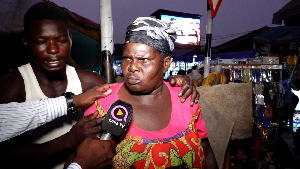Accra, Sept. 25, GNA - As the crippling energy crisis slowly comes to an end, consumers are not only heaving a sigh of relief but are also counting the cost of the crisis which has just crossed the one-year mark.
Lives were lost because of lack of power, lives were lost because fumes of generators, which became the order of the day at homes and offices, chocked them to death and lives were lost because naked fires, such as candles, stoked fires.
Industrialists, who have had to use generators to get work going, complained of high cost of production and critical cash situations, domestic consumers, especially housewives, bemoaned destruction of food while electrical appliances broke down because of frequent power cuts. The most hit in terms of cost was bulk users such as the mines, who were asked by the VRA to cut consumption by up to fifty percent. This situation, according to the Chamber of Mines, undermined the prospects of the industry.
In an earlier interview, Dr Chris Anderson, External Relations Manager of Newmont Ghana, said the crisis worsened the financial situation because the company's plant had to run on generators, thereby making its operations much more expensive. "The cost of running the generators is four times higher," he added.
Generally, the Chamber of Mines said with the high price of diesel, some mining companies were spending about two million dollars a month on average to generate additional power, and companies that did not have adequate self-generating capacity had to resort to batch processing to cope with the cut in power supply to their operations. Another critical casualty was the Ghana's only aluminum smelter, the Volta Aluminium Company, which had to shut down completely to complement the national load shedding program.
Domestic users also suffered hardships in the face of the load shedding.
Mrs Vivian Nuhu, a home owner at South La in Accra, on Tuesday told the Ghana News Agency that during the energy crisis, she spent more than twice what she usually paid monthly for power from the national grid running her electricity generator.
She said prior to the energy crisis she bought 150,000 cedis worth of credit for her pre-paid meter for a month. However, during the crisis, she had to buy a generator at eight million cedis. Then, in addition to the 150,000 cedis credit every month, she bought 90,000 cedis worth of fuel for the generator for a week. By implication, Mrs Nuhu said she spent at least 360,000 cedis on fuel plus 150,000 cedis electricity credit to ensure that she had power whenever she needed it.
According to Mrs Nuhu, she usually did not use the generator during the day and that in the night she used it till about 2200 hours when she went to bed.
"I switch off the generator when I go to bed for fear of it either catching fire when I am asleep or being stolen. I have four additional rechargeable lamps which I use when I need light at dawn," she said. Mrs Nuhu said it cost more to use generators by far than to have power flowing regularly from the national grid, adding that the cost of the burden was way above her budget but she needed to make those expenses for obvious reasons.
Mr Horst Koranteng, son of Madam Emelia Teinor, owner of Emy's Maternity at Kwashibu in Accra, also told the GNA that for their four-bedroom apartment and the maternity home they run, they paid between 400,000 cedis and 500,000 cedis electricity bill every month until the power crisis started.
During the power crisis they bought and ran a 12 million-cedi generator, which consumed 100,000 cedis worth of fuel every two days. In effect their household and the maternity home spent not less than an additional 1.5 million cedis a month on fuel to ensure that there was enough power to serve the house and the maternity home all day everyday.
Mr Koranteng said they could not fathom why their electricity bill still ranged between 400,000 cedis and 500,000 cedis every month during the crisis period, but they kept paying that amount alongside heavy expenses in running the generator.
The energy crisis hit this country in August 2006 when the water level in the Akosombo Dam, the country's main hydroelectric power source, plummeted and other sources of energy diminished or ran dry. Within the over one year the crisis lasted government and its appointed managers of the country's energy resources have fought tooth and nail to end the uncomfortable situation.
Currently the situation has improved with the rise in the water level in the Akosombo Dam, generation from various emergency plants and supply from Cote d'Ivoire.
Meanwhile, in what promises to be a lasting solution to the history of energy crisis in the country, President John Agyekum Kufuor recently cut the sod for the construction of the Bui Dam to supplement power from Akosombo Dam.
The project is poised to be completed in a few years and would provide about 400 megawatts of power when completed and made fully operational.
Meanwhile some homes continued to pay dearly to have adequate energy until the crisis is completely over.
General News of Tuesday, 25 September 2007
Source: GNA












